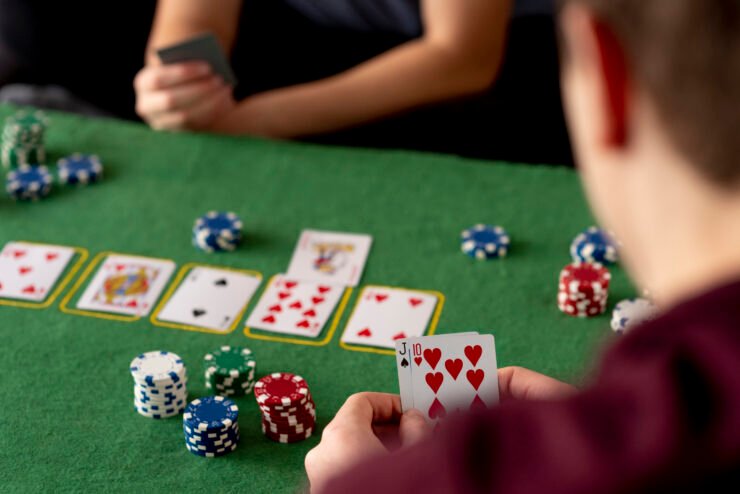Gambling addiction, also known as compulsive gambling or gambling disorder, is a serious condition characterized by uncontrollable engagement in gambling despite adverse consequences. This addiction leads to significant personal, social, and financial problems. To address gambling addiction effectively, it’s crucial to understand the common situations that contribute to this condition, recognize the signs of problem gambling, and explore the neurobiological mechanisms that underpin it.
Common Situations Leading to Gambling Addiction
- Psychological Factors
- Emotional Distress: Individuals may use gambling as a way to escape from emotional pain, stress, anxiety, or depression, finding temporary relief from negative emotions.
- Escapism: Gambling can become a distraction from personal issues or dissatisfaction with life, offering a way to avoid confronting underlying problems.
- Socioeconomic Factors
- Financial Pressure: Economic hardship or financial difficulties can drive people to gamble, hoping to solve their problems with a significant win.
- Economic Opportunities: Easy access to gambling venues like casinos, online gambling sites, or betting shops can increase the risk of developing an addiction.
- Behavioral and Cognitive Factors
- Gambler’s Fallacy: The belief that past gambling outcomes affect future results, such as expecting a win after a series of losses, can lead to persistent gambling.
- Overconfidence: Individuals may continue gambling despite repeated losses, believing they have special skills or systems to win.
- Social and Environmental Influences
- Peer Pressure: Social circles and peer groups involved in gambling can influence individuals to start or continue gambling, with communal activities reinforcing the behavior.
- Advertising and Marketing: Aggressive marketing tactics, including promotions and bonuses, can lure individuals into gambling. The media’s glamorization of gambling also contributes to addiction.
- Biological and Genetic Factors
- Genetic Predisposition: Genetics may play a role in susceptibility to gambling addiction. Those with a family history of gambling problems might be at higher risk.
- Neurobiological Factors: Imbalances in brain chemicals like dopamine, which are associated with the reward system, can contribute to gambling addiction.
- Personal Characteristics
- Impulsivity: Higher levels of impulsivity and poor impulse control increase the likelihood of gambling and developing addiction.
- Personality Traits: Traits such as thrill-seeking or risk-taking tendencies can make individuals more prone to gambling problems.
- Life Events and Stressors
- Traumatic Events: Trauma or significant life changes, such as the loss of a loved one, divorce, or job loss, can trigger gambling as a coping mechanism.
- Major Life Transitions: Significant transitions like retirement or major lifestyle changes may lead individuals to seek excitement or distraction through gambling.
- Cultural and Societal Norms
- Normalization of Gambling: In cultures where gambling is normalized and integrated into social activities, individuals may be more likely to develop gambling problems.
- Legal and Regulatory Environment: The availability and regulation of gambling can influence addiction rates. Limited regulations and oversight may lead to higher rates of problem gambling.
The Neurobiology of Gambling Addiction
- Brain Regions Involved
- The Ventral Striatum: This area is crucial for the reward system and becomes hyper-responsive to gambling-related cues in addicts, reinforcing the behavior.
- The Prefrontal Cortex: Responsible for decision-making and impulse control, this area is often impaired in gambling addicts, leading to poor decision-making.
- The Amygdala: Involved in processing emotions, it heightens emotional responses to gambling wins and losses, increasing the drive to continue gambling.
- Dopamine Dysregulation
- Dopamine Sensitization: Repeated gambling increases dopamine sensitivity to gambling stimuli, leading to stronger cravings.
- Dopamine Deficiency: Chronic gambling can deplete dopamine levels, reducing the ability to experience pleasure from other activities and reinforcing the need to gamble.
- Altered Reward Pathways
- Shift in Reward Processing: In gambling addicts, the anticipation of winning and the thrill of gambling can overshadow other rewarding experiences, contributing to compulsive behavior.
- Cognitive Distortions
- The Gambler’s Fallacy: Believing that past outcomes influence future results.
- Illusion of Control: Overestimating one’s ability to influence gambling outcomes.
- Overestimation of Wins: Exaggerating the frequency and magnitude of wins while downplaying losses.
- Emotional Regulation
- Coping Mechanism: Gambling can be used to manage negative emotions or stress, becoming the primary way to handle emotional distress.
- Social and Environmental Influences
- Exposure to Gambling Environments: Access and exposure to gambling opportunities can increase addiction risk.
Signs of Problem Gambling
Recognizing the signs of gambling addiction is crucial for intervention:
- Increasing Bets: Betting larger amounts or spending more time gambling.
- Loss of Control: Difficulty controlling or reducing gambling activities.
- Neglect of Responsibilities: Ignoring personal, professional, or social responsibilities due to gambling.
- Financial Problems: Financial difficulties or debt due to gambling.
- Deception: Hiding gambling behavior or lying about its extent.
- Emotional Changes: Mood swings, irritability, or depression related to gambling.
Support and Resources
Effective management of gambling addiction includes:
- Education and Awareness: Raising awareness about the risks and signs of gambling addiction.
- Support Systems: Access to counseling, support groups, and treatment programs.
- Regulation: Implementing policies to regulate gambling and protect vulnerable individuals.
- Healthy Coping Mechanisms: Encouraging alternative ways to manage stress and emotions.
Local Services: Includes counseling, support groups, and treatment programs.
Helplines: Contact information for crisis helplines and support lines for immediate assistance.
Online Resources: Tools for self-assessment and finding appropriate help.
Professional Help
- Counseling and Therapy: Professional guidance and therapy from addiction counselors specializing in gambling.
- Treatment Programs: Information on inpatient and outpatient programs to choose the best approach for individual needs.
Support for Family and Friends
- Guidance for Supporters: Advice for family and friends to understand and support the individual without enabling the behavior.
- Encouragement: Supporting the individual in seeking help and maintaining open communication about gambling’s impact.
By addressing both the neurobiological and psychological aspects of gambling addiction, individuals can work towards recovery and regain control over their lives. Understanding the brain’s role and the contributing factors can provide a comprehensive approach to managing and overcoming gambling addiction.
Mind Care Wisdom
mindcarewisdom.com















